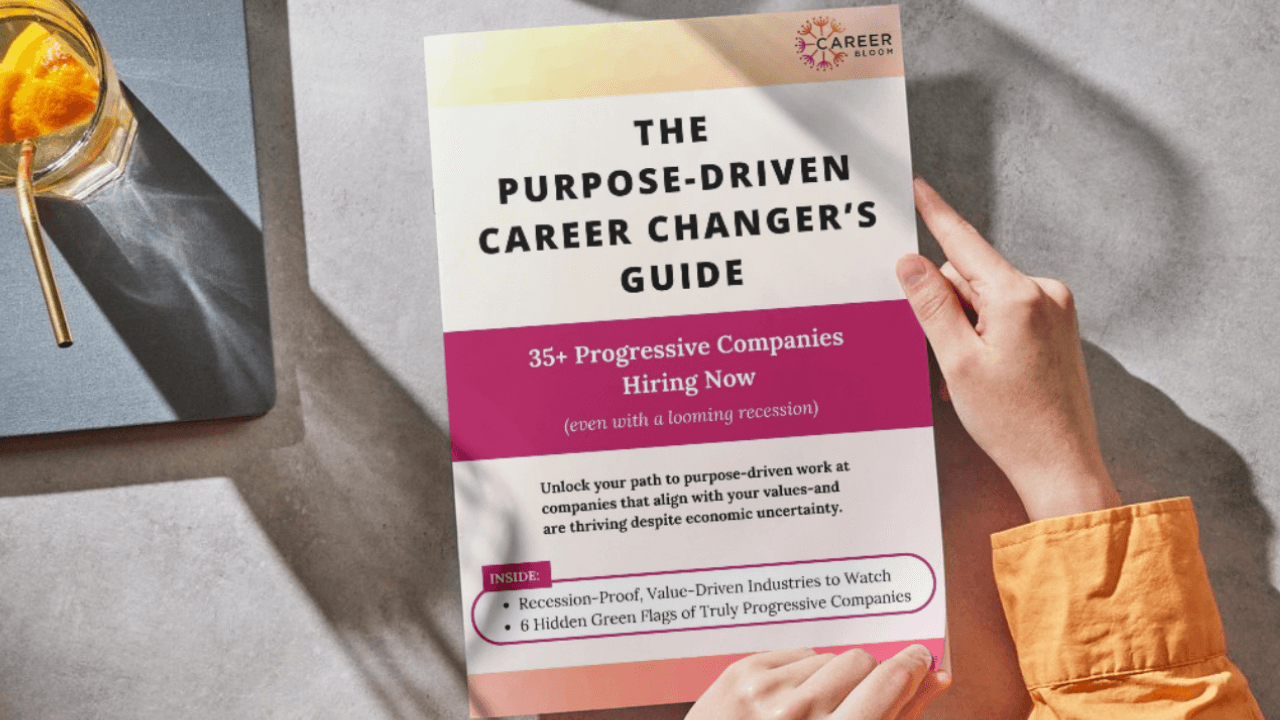
You’ve built the career. Climbed the ladder. You’re the go-to person on your team, the one who gets it done, and usually better than anyone else.
On paper, you’re thriving. But inside? You’re running on fumes. Exhausted. Drained. Wondering how something you used to love now feels like a never-ending to-do list.
Sound familiar?
You’re not broken. You’re not alone. What you’re feeling is burnout. Not the dramatic, collapse-in-the-breakroom kind, but the sneakier version that shows up in high-achieving professionals who care deeply and give their all… until there’s nothing left to give.
Because burnout doesn’t always come from hating your job. Sometimes it comes from doing the exact work you used to love, just in an environment that slowly drains the joy out of it.
Let’s talk about that.
This blog unpacks why burnout looks different for high performers—and how to start recovering without quitting your job and running off to Bali. (Unless you want to. In which case… send pics.)
Let’s start with something most of us were never taught to notice.
The Warning Signs of Job Burnout
Burnout doesn’t always hit like a breakdown. Sometimes, it creeps in while you’re still crushing deadlines and saying, “It’s fine, I’ve got it.”
But behind the high performance? Things start to slip—like joy, energy, and the ability to care about yet another Monday meeting.
Here Are 5 Signs of Work-Related Burnout:
1️⃣ You’re tired all. the. time.
Not just sleepy. It’s that deep, brain-fog tired that even a full weekend off can’t fix.
2️⃣ The spark’s gone missing.
What used to light you up now feels like going through the motions. You’re showing up, but it’s starting to feel a little... autopilot.
3️⃣ You’re feeling quietly resentful.
At your team. At your boss. At your inbox. You’re doing the most, but wondering if anyone even sees it.
4️⃣ You’re never fully “off.”
Even when you’re logged out, your mind is still pinging with things you need to do. You can’t seem to turn it off.
5️⃣ Tiny tasks feel weirdly hard.
Responding to that email? Attending that check-in? Everything feels heavier than it should.
If even one of these made you nod, it's a sign. You don’t have to blow up your life to feel better, but you do deserve more than just getting by.
Want to reconnect with the work that actually energizes you? Download the FREE Ultimate Transferable Skills Guide.
It’s not just a checklist. It’ll help you pinpoint the skills that light you up—the kind that make you say, “I want more of this.”
Download your copy of the FREE Ultimate Transferable Skills Guide.
Meet Alena: The High Performer Who “Had It All Together”
Alena is the kind of professional every company dreams of having. Sharp. Driven. Unshakably organized.
Her career has spanned fashion design, entrepreneurship, consulting, and large-scale transformation leadership.
Her spark? Creating order out of chaos.
“I think I do that on a daily, minutely, hourly, weekly—like literally every day,” she told me.
“I’m constantly creating artifacts, constantly organizing things to align clients. It’s just part of who I am.”
She’s not exaggerating. Alena is the person who steps into the mess, sees the big picture, and makes it all make sense. It’s not just her job. It’s her zone of genius.
So it wasn’t surprising when she stepped away from a big project and her absence was felt immediately.
“When I came back, they made it really clear how much they valued my work. I got a lot of validation.”
She was respected. Trusted. In demand. On the outside, everything looked right.
But on the inside, something was off.
And that's where our story really begins.
Work Burnout Isn't Always About Working Too Much
Let’s bust a myth real quick: burnout isn’t just about long hours.
Yes, working late night after night can wear you down—but for high achievers, burnout usually runs deeper. It’s not just about the hours you’re clocking. It’s about what those hours are filled with.
It’s the mismatch between what energizes you and the environment you’re expected to deliver it in.
You might actually like the work... but the context strips it of its spark.
That’s exactly what was happening for Alena.
For her, it wasn’t the challenge that wore her down. It was everything surrounding it.
“What drains me is incompetence. When I have to walk someone through something super basic... I’m running 200 miles a minute. I don’t really have time to slow down and train someone to catch up.”
Sound harsh? It’s not. It’s honest.
High performers move fast. They think strategically, solve problems in real time, and see six steps ahead.
So when they’re constantly stuck in repeat-mode—re-explaining, re-organizing, redoing things that never should’ve gone sideways in the first place—it starts to take a toll.
“It’s not meaningful to me… I take detailed notes. I remember things. But when someone keeps asking the same thing over and over? That kind of stuff kills your soul. Once is fine. Again and again? No.”
That’s the emotional tax of being the one who always picks up the slack. It builds slowly. Then all at once.
When Your Job Is Too Much for One Person
You’re juggling meetings, managing projects, catching mistakes, unjamming workflows, and answering “quick questions” that are never actually quick.
The problem isn’t that you can’t handle it. It’s that you were never supposed to carry this much on your own.
When one person becomes the unofficial project manager, team therapist, copy editor, and catch-all for dropped balls, it’s only a matter of time before something gives.

The Emotional Cost of Always Being “The One”
It’s one thing to be great at your job. It’s another to quietly become the person everyone leans on—whether it’s your responsibility or not.
High achievers are often not just the doers, but the glue. They lead the meetings, smooth over the chaos, translate confusion into clarity. They’re also the ones advocating for equity, fairness, and inclusion—making sure voices are heard, people feel seen, and no one slips through the cracks.
Alena knows that role all too well.
“I'm constantly chatting or talking. So people expect me to take the lead… and that is also so draining.”
“Even in large meetings, I make sure if a group hasn’t spoken, I’ll ask someone to speak for them. In personal life, I do it too. I just feel this need to make sure people are included.”
These are beautiful qualities. Empathy. Awareness. Leadership.
But let’s be honest—they’re also heavy.
The more capable you are, the more people expect you to carry. Not just projects. People’s feelings. Team drama. Communication breakdowns.
And over time? That kind of weight catches up with you. Even if you're the one who's usually got it all together.
When The Culture Doesn’t Match the Spark
Sometimes, the work you love becomes exhausting not because of what you do, but because of where you do it.
“I’m so disillusioned by corporate that I can’t think of any [moments of joy]… I feel like I’m running a hamster’s wheel.”
“Right now I am feeling burnt out… because I've been in back-to-back calls all week.”
“It’s the leadership, it’s the culture. It’s not the most conducive for growth… My career’s come here to die… The people who are doing nothing get to coast… That unfairness drives me mad.”
Let’s pause for a second.
Can you relate to that? Have you ever looked around and wondered why the ones who go above and beyond seem to be taken for granted, while others coast with no consequence?
It’s wild how fast a toxic or misaligned culture can kill your motivation. There’s nothing more frustrating than giving your best and realizing the system doesn’t reward effort.
You’re not imagining it. You’re not too much. You’re just tired of being in a place that doesn’t deserve you.
The Paradox of Fulfillment and Fatigue
Here’s the unexpected truth about burnout for high-achieving professionals: You can be doing the exact work you’re meant to do—and still feel exhausted by it
Because fulfillment and fatigue can coexist. And that’s what makes this kind of burnout so confusing.
“There are days when I really enjoy it… and days when I’m completely wiped.”
“I think I’m a good manager—I advocate for my team. But being a mentor? That takes energy I don’t always have.”
“If I’m not getting recognition, it’s just… demoralizing. It chips away at me.”
You can love what you do and still feel depleted by how much emotional labor it requires. You can believe in your team and still feel frustrated that you’re pouring from a cup no one’s refilling.
Here’s what’s powerful about these reflections: they show awareness.
And awareness is the first step toward change.

5 Steps to Recover From Burnout Without Quitting Your Job
If you’re resonating with Alena’s story, it’s probably time to pause, zoom out, and recalibrate. You don’t have to blow up your life to feel better, but you do need to shift a few things.
Here’s where to start:
1️⃣ Acknowledge the Reality Without Guilt
Burnout doesn’t mean you’re weak. It means something about the way you’re working isn’t working for you. Your capacity hasn’t failed—your conditions have.
Instead of pushing through, give yourself permission to name what’s happening. You’re not lazy. You’re not dramatic. You’re just done being stretched beyond what’s sustainable.
2️⃣ Name What Energizes You—and What Drains You
Keep it simple: two columns in a notebook or a note in your phone.
- What gave you energy today?
- What drained it?
It might be a type of task, a conversation, a team dynamic, or even a meeting format. Do this for a week and patterns will start to surface. That’s your roadmap.
3️⃣ Reevaluate Your Environment
Even meaningful work will wear you down in the wrong context. Ask yourself:
- Does this culture align with my values?
- Am I recognized for what I bring?
- Is my pace respected—or just exploited?
If the answer to most of these is “eh, not really,” the issue might not be the work itself. It might be where you’re doing it.
4️⃣ Set Boundaries Without Apology
Being capable doesn’t mean you should carry everything. Advocate for yourself as much as you advocate for others. Protect your time.
Say no.
Delegate. And remember, just because you can doesn’t mean you should.
5️⃣ Don’t Be Afraid to Pivot (You’re Not Starting Over)
Alena is a perfect example of this. She’s pivoted multiple times—across functions, sectors, and organizational cultures—each building on the one before.
You’re never starting from scratch. You’re starting from experience.
Whether it’s moving into a more values-aligned company, stepping into a leadership role that prioritizes strategic thinking over hand-holding, or shifting industries entirely—you have more options than you think.
FAQs About Job Burnout and Stress at Work
Do I hate my job or am I just burned out?
Ask yourself this: Would I enjoy this work in a healthier environment with better boundaries and support?
If the answer is yes, it’s probably burnout. If the thought still makes you dread Mondays… it might be time for a bigger change.
What to do when overwhelmed at work?
Step back. Prioritize. Cut the non-essential.
Even a 15-minute reset can help you regain clarity. And remember: overwhelmed doesn’t mean you’re failing, it means something needs to shift.
What are the best jobs for people with anxiety?
The best roles are the ones that support your nervous system instead of setting it on fire. Look for jobs with clear expectations, supportive leadership, predictable routines, and space to work independently when needed.
Some people with anxiety thrive in roles like writing, research, design, data analysis, or operations—anything where they can go deep, focus, and create impact without constant interruptions or chaos.
But the real key? Work that aligns with your strengths, values, and energy, because when you're doing work that fits, your anxiety doesn’t have to work so hard to protect you.
Ready to find values-aligned work that actually fits? Grab the free guide to companies that get it.
You Deserve to Thrive, Not Just Survive
Burnout isn’t a badge of honor. It’s a signal. A call to step back, realign, and choose yourself—before your body or your joy makes that choice for you.
Alena’s story isn’t about defeat. It’s about clarity. About naming what works, what doesn’t, and taking back her energy without walking away from everything she’s built.
You can do that too.
Your spark is still there. It’s not gone—it’s just buried under layers of expectation, exhaustion, and trying to hold it all together.
It’s time to dig it back out.
You don’t have to pick between ambition and well-being.
You get to have both. And you deserve both.
Let this be your sign: burnout isn’t the end of your story.
It’s the moment you start writing a better one—on your terms, in your voice, with your fire fully lit again.
About the Author and Career Clarity Coach
Theresa White, Career Clarity Expert, 5x Certified Career Coach, and the Founder of Career Bloom, is known for her expertise in guiding people to get unstuck and find the direction they need to move forward in their careers—fast. In a time when so many people are re-evaluating their work, Theresa offers actionable insights that empower clients to identify their true strengths and pursue work that genuinely aligns with their goals.
Theresa’s clients often call her sessions “epiphanies” and “transformational.” She brings immediate clarity to career goals, helping people unlock a deep understanding of what makes work fulfilling for them. Past participants consistently describe her approach as “spot on” and an “answer to questions they’d been asking for weeks.”
Theresa’s approach is empathetic yet practical, and she’s known for empowering clients with a clear direction in as little as 30 days, guaranteeing results.
Connect with Theresa on LinkedIn, listen to the Career Clarity Unlocked Podcast, or schedule your free 30-minute career clarity consultation.
Related Reads
- How to Gain Career Clarity and Find Your Purpose
- How to Actually Land a Job Through Networking
- 7 Message Templates to Reach Out to Recruiters
- How to Use AI to Find a Job in 2025: Why Soft Skills Still Matter
- Find Your Career Passion: Get Paid for What You Love
- How to change career in 2025
- Free Job Search Tracker
- Get Career Clarity In Just 30 Days!
Subscribe now to never miss the latest blog!
Every Thursday, we cover an important topic, actionable advice, and inspiring content to help you find work that makes you feel like *pinch me* I'm getting paid to do this???
We hate SPAM. We will never sell your information, for any reason.





